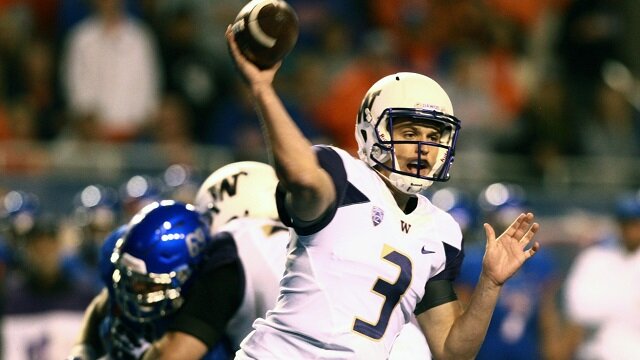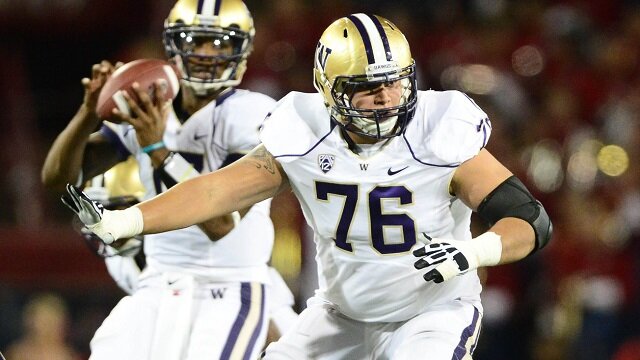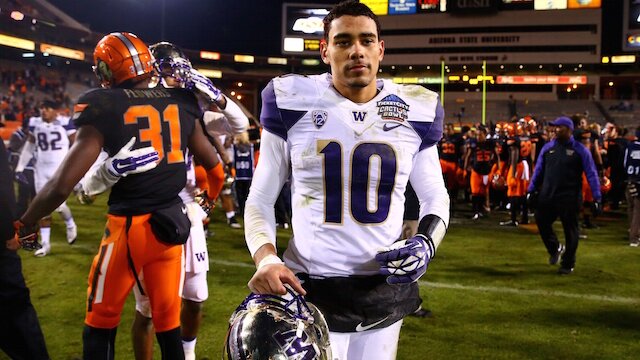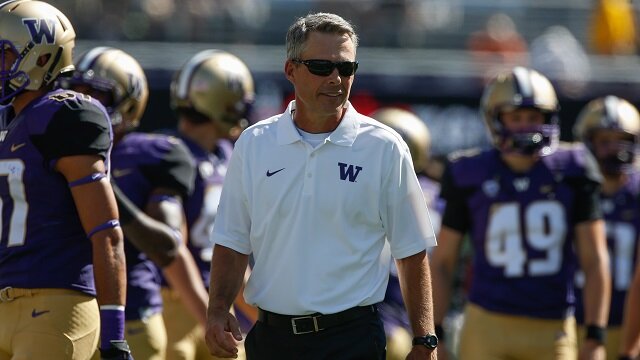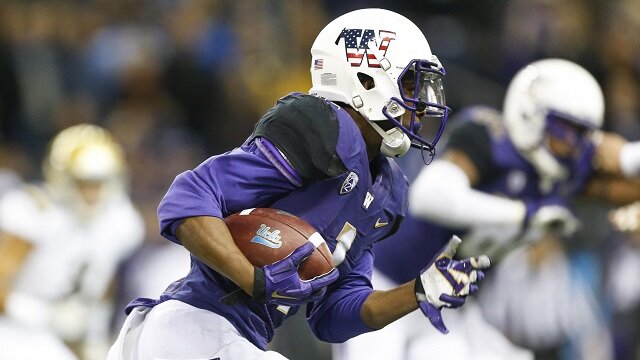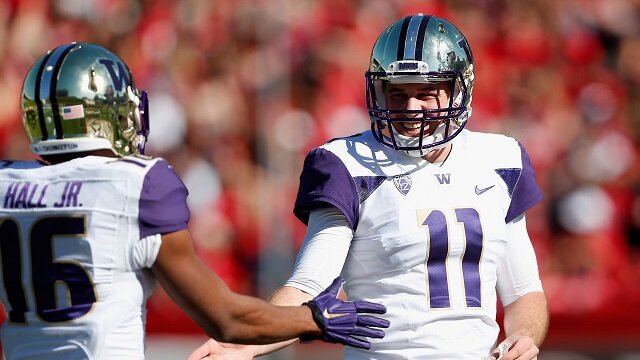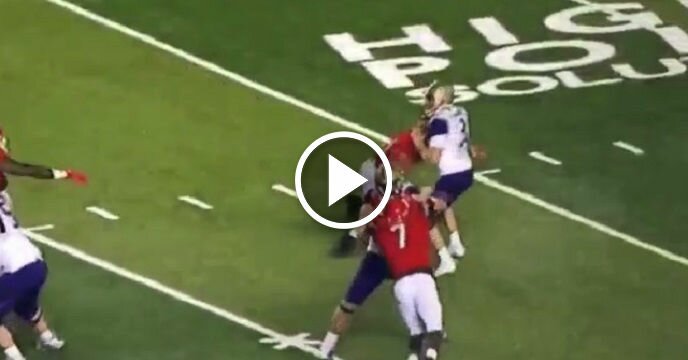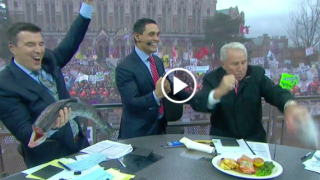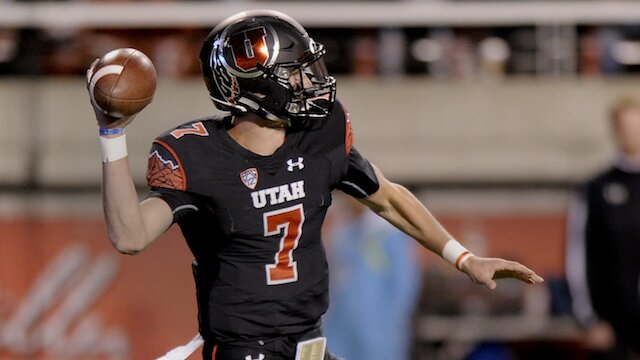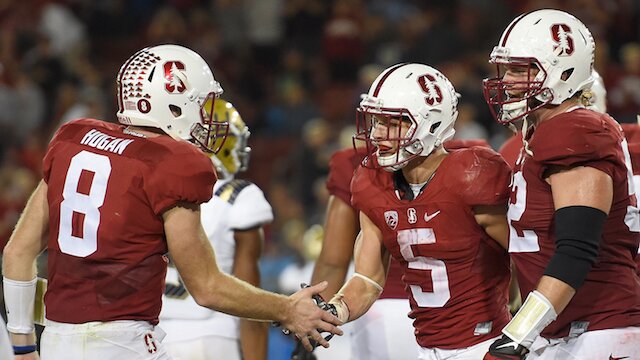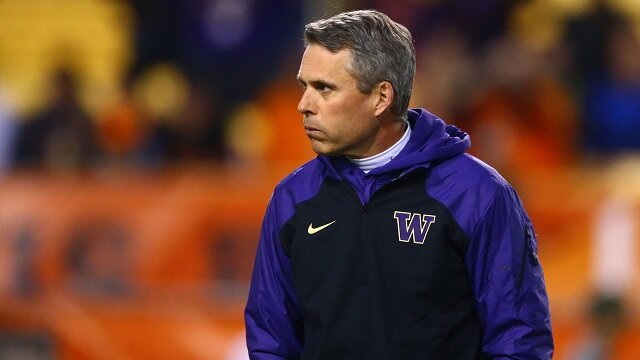
Head coaches generally get a pass in their first year at a program as they adjust to their new surroundings and start to imprint their personalities and philosophies on the team. But many jobs don’t give you the same leeway in year two and no second-year coach may be facing the amount of pressure that Chris Petersen faces with the Washington Huskies in 2015.
Part of the problem that Petersen has in Seattle is that he inherited an environment that really required a fast start. The Huskies’ fanbase is a frustrated bunch after a challenging couple of decades following their national title run in 1991. After a history of football excellence, Washington has grown impatient waiting for someone to return them to glory.
Things started to downhill when legendary head coach Don James abruptly resigned in protest of the NCAA sanctions placed on the school following an investigation that found a number of Washington players were receiving improper benefits. James built the Huskies into a national power during his 18-year tenure that included four Rose Bowl wins, an Orange Bowl win, the 1991 national championship (shared with the Miami Hurricanes), a 22-game winning streak from 1990-1992 and three national coach of the year honors.
His sudden exit pushed defensive coordinator Jim Lambright into the head coaching position. Lambright did an admirable job, leading Washington to four bowl game appearances in six seasons and 44-25-1 overall record, but he couldn’t replicate James’ success at the helm, going just 1-3 in bowl games, and he was fired after going 6-6 during the 1998 season.
Then Rick Neuheisel came to town, lured away from the Colorado Buffaloes as one of the hottest coaching names in the country at the time, and gave Washington their greatest success since the Don James era. Under his watch, UW went 33-16 and won the 2001 Rose Bowl over the Purdue Boilermakers, their first Rose Bowl championship since 1992. As it turned out, it would be Washington’s last taste of the “Granddaddy of them All” for quite some time.
Neuheisel was abruptly fired in the summer of 2003 after he admitted to participating in a gambling pool for the 2003 Men’s NCAA basketball tournament. Offensive coordinator Keith Gilbertson was promoted to head coach to replace Neuheisel but lasted just two seasons, accumulating a 7-16 record, including just 1-10 in 2004, with no bowl appearances, becoming the first Washington coach not to make a bowl game since Darrell Royal in 1956.
Following Gilbertson’s difficult tenure was former Stanford Cardinal and Notre Dame Fighting Irish head coach Tyrone Willingham. He failed to turn things around, posting four straight losing seasons, culminating in a winless 2008 season. He left UW with the worst winning percentage (.229) of any head coach in the history of the Huskies’ football program.
From that wreckage, Washington was rebuilt by former USC Trojans offensive coordinator Steve Sarkisian. While Sark suffered just one losing season in his five years at UW, patience started to wear thin for the coach as he never won more than eight games in a single season and was just 1-2 in bowl games. There were rumblings that the university was set to fire Sarkisian if he failed to make out from under his 8-win ceiling but he spurned the Huskies to return to USC before they had the chance to fire him following the 2013 regular season.
So that is the climate that Petersen walked into when he took the head coaching job for UW. A program that suffered a steep decline from its highest point, left by a coach before they could get rid of him, and stuck as a second-tier Pac-12 team looking up at the likes of the Stanford Cardinal and Oregon Ducks (who have won the last 11 meetings of their rivalry game by at least 17 points, by the way) in the North Division. It’s a fan base that is on edge and a football program that needs to find some success immediately.
That is what makes Petersen’s first year on the job just another part of why he needs to find success in year two. With arguably one of the most talented defenses in the conference, Washington still couldn’t manage to break through and contend for the Pac-12 title in 2014. They finished with another 8-win season, likely causing some rage flashbacks for UW fans, including a dismal 0-5 record against ranked opponents and coming up short in their TicketCity Cactus Bowl appearance against the Oklahoma State Cowboys.
With the roster Washington had going into the 2014 season and the schedule that set up pretty nicely for them, eight wins was the absolute minimum they should have won so Petersen didn’t really impress anyone by hitting that win total. Add in the near upsets they avoided at the hands of the Hawaii Warriors (17-16 win for UW) and FCS Eastern Washington (59-52), and the Huskies were on the verge of a pretty disastrous debut for Petersen.
In reality, year one at Washington just reinforced some of the concerns that people had when the Huskies announced the hire of Petersen away from the Boise State Broncos. While at Boise, Petersen was one of the premier coaches in the country because of his ability to get his team to play above their ability in big games to upset bigger programs, like his famous Fiesta Bowl win over the Oklahoma Sooners. His work in building BSU into an elite mid-major football program was admirable, to be sure, but it doesn’t buy him a lot of room to struggle at Washington.
That’s because the expectation level and the pressure between the two jobs is drastically different. At Boise, Petersen was recruiting overlooked talent that he could then develop into a team that worked well together to rise up and play with some of the top teams in the country once or twice a season without the facilities or prestige of a truly elite program.
The Huskies, on the other hand, have the facilities and the history to at least be in the mix on an annual basis for the conference title. Petersen can’t get by recruiting under the radar guys, he has to be able to go into the living rooms of elite recruits and out-sell the top recruiters in the nation. He has to deal with the pressure of being the bigger program and getting his team to play up to their full ability on a weekly basis if they hope to be relevant in the conference title race.
That did not happen in 2014 for Petersen. The Huskies finished eighth in the Pac-12 last season with a 4-5 conference record. Their four conference wins came against teams who combined to go just 7-29 in Pac-12 play and none of them ended the year bowl eligible. In fact, just one of their eight wins last season came against an FBS team that went to a bowl game, and that was the 6-7 Illinois Fighting Illini.
In year two, Petersen needs to get a big time win under his belt and move the Huskies towards Pac-12 title contention or he’s going to be feeling the heat. That will be difficult looking at the Huskies schedule. They open the season on the blue turf of Boise State as Petersen returns to his former home in what should be an emotionally charged season opener for both sides. The Broncos, who went 12-2 last season including a 38-30 win in the Vizio Fiesta Bowl over the Arizona Wildcats (27-26 winners over UW last season) in their first year post-Petersen, will be fired up to take it to their former coach and avenge the 38-6 drubbing they took the last time they played the Huskies.
If Petersen can get Washington through that daunting trap game, they face a perilous conference slate this fall with road games against the USC Trojans, Stanford Cardinal, and Arizona State Sun Devils (who have won nine straight against the Huskies) along with their rivalry game against Oregon in Seattle. They are fortunate to avoid the UCLA Bruins, who beat them 44-30 last season, but also lose the Colorado Buffaloes, one of their four conference wins a year ago, from their schedule.
Further complicating matters for Petersen is the incredible amount of turnover that he has to deal with this offseason, particularly on defense. The Huskies lose key contributors like All-Americans Shaq Thompson and Danny Shelton, college football’s 2014 sack leader Hau’oli Kikaha, leading tackler John Timu, and likely first-round NFL draft pick Marcus Peters (who was dismissed from the team early in 2014) are all gone. Offensively, Washington has to rebuild its offensive line and will now be without quarterback Cyler Miles for the 2015 season after he reportedly stepped away from football for personal reasons.
But turnover is a part of college football and Petersen has a reputation of being a program builder so he won’t get a lot of slack just because his depth chart is changing dramatically. In order to appease a frustrated fan base, Petersen needs to show some progress in 2015 towards restoring Washington to a Pac-12 contender and break them out of their current second tier status.
If he can’t, expect the pressure to get turned up in Seattle and for Chris Petersen to end up in the coaching hot seat. There’s no denying that Petersen is an excellent coach with a track record of success. Will he get enough time in Seattle to keep that success going and get UW into the Pac-12 title hunt?
You can follow Tyler Brett on Twitter @ATylerBrett, on Facebook and on Google.
 Share
Share 

